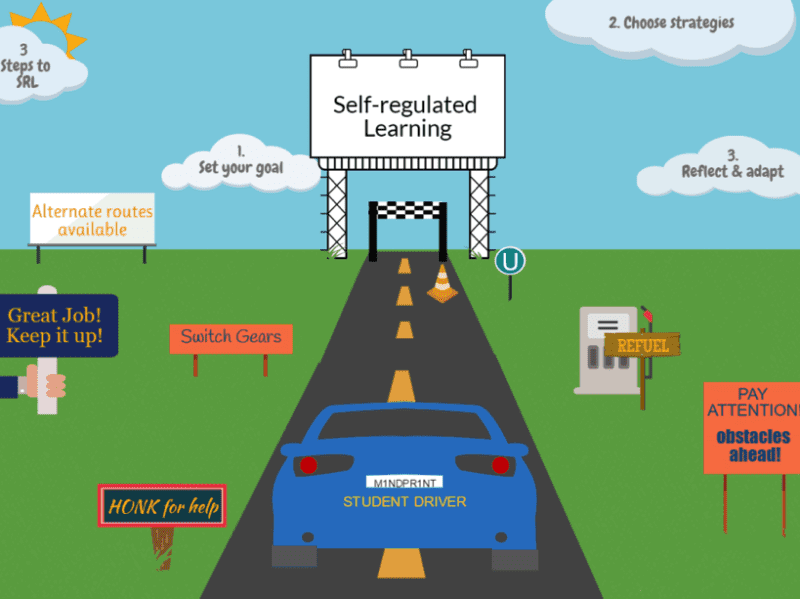Table of Contents
Success is in the hand of the student
By Nancy Weinstein
This is part two of a two-part series
In part one of this series we discussed how combining new options for accurate and objective cognitive assessment (attention, memory, processing and reasoning), along with traditional academic achievement data, is the missing piece to enabling self-regulated learning. If we know self-regulated learning is the best way to reach every student and we know we can efficiently get the data to support self-regulated learning, the only question is HOW.
HOW do we do it?
We return to CMU’s Self-Regulated Learning Model. We love this model because it really is so simple. The model that is. Nothing about teaching or learning is simple. However, if we can adopt a structure that is straight-forward to teachers and students alike, the focus can be on learning and not on how to implement another rubric or standard.
As we discussed in Part 1 of this series, the success of this model depends on students being intrinsically motivated to succeed, embracing a growth mindset, and possessing a sufficient self-awareness of their capabilities and needs. Of course, these foundational characteristics are shown to be important to learning across teaching models. However, they are arguably far more critical to self-regulated learning, which depends on students taking the lead in driving the learning process, working independently, and recognizing when and how to ask for help. With a strong foundation in place, the rest is [relatively] easy.
Set goals
There’s no shortage of great materials on effective goal setting, (SMART goals, etc.) so assume those rules apply. However, goal setting with an audience of adolescents does present its own unique set of challenges.
Each student’s goals need to reflect each student’s intrinsic interests. Students need to have a good answer for themselves to the question, “Why am I doing this?” Otherwise, they could easily be distracted by competing interests or have a setback that morphs into a failure. Keep in mind that students might not have the context or foresight to see the bigger picture on their own. They still need their teachers to open their eyes to why the work matters before they can be expected to discover their own meaning.
Let’s not forget that adolescents are at a unique and asynchronous stage in their emotional, social and cognitive development. Some of their needs are developmental while others are more specific to their unique profiles. Consider when a student’s goals should extend beyond his immediate academic performance to include other skills that might be equally important to his lifetime success, such as collaboration, communication and flexible thinking. You’re likely to find that when students expand the scope of their goals, even your highest achievers will find they have clear room to grow. Similarly, those “struggling learners” are likely to discover opportunities where their strengths can shine and their self-confidence can grow.
Choose strategies
It might feel somewhat surprising to know that there is an abundance of evidenced-based strategies that can help students learn more easily, focus more consistently, and remember and recall more efficiently. Teachers and tutors use them all the time. When a student says my teacher “gets me” what he is really saying is that his teacher helps him use the strategies that work best for him so he understands and remembers.
So how do we support teachers to “get” all the learners in their classroom? Objective data on cognitive skills is the game changer. The insight that was heretofore available only through very careful teacher observation (if students were lucky), can now be collected through affordable online cognitive tests. That data enables us to efficiently predict which of the hundreds of strategies would best suit each student, whether he is solving problems in math class, writing an English paper, or working a hands-on project in the shop.
Reflect and adapt
To be fair, it’s not quite that easy. Identifying and effectively using the best-fit strategies takes time, effort and some amount of trial-and-error. Even the best algorithm cannot predict personal preferences, environmental factors, and all the other nuances that go into effective learning. But they can help narrow down the choices to the handful that make the most sense for any given student. Add to that effective teacher coaching and a student who asks for help and is receptive to feedback, and the road to success is reasonably straight-forward.

Author
Further Reading
- edCircuit – Self-Regulation Using Cognitive Data is Key to Personalization
- Teacher Magazine – Teaching self-regulated learning skills
- Education World – Elementary School Creates Superhero ‘Mindset Man’ to Encourage Growth Mindset
